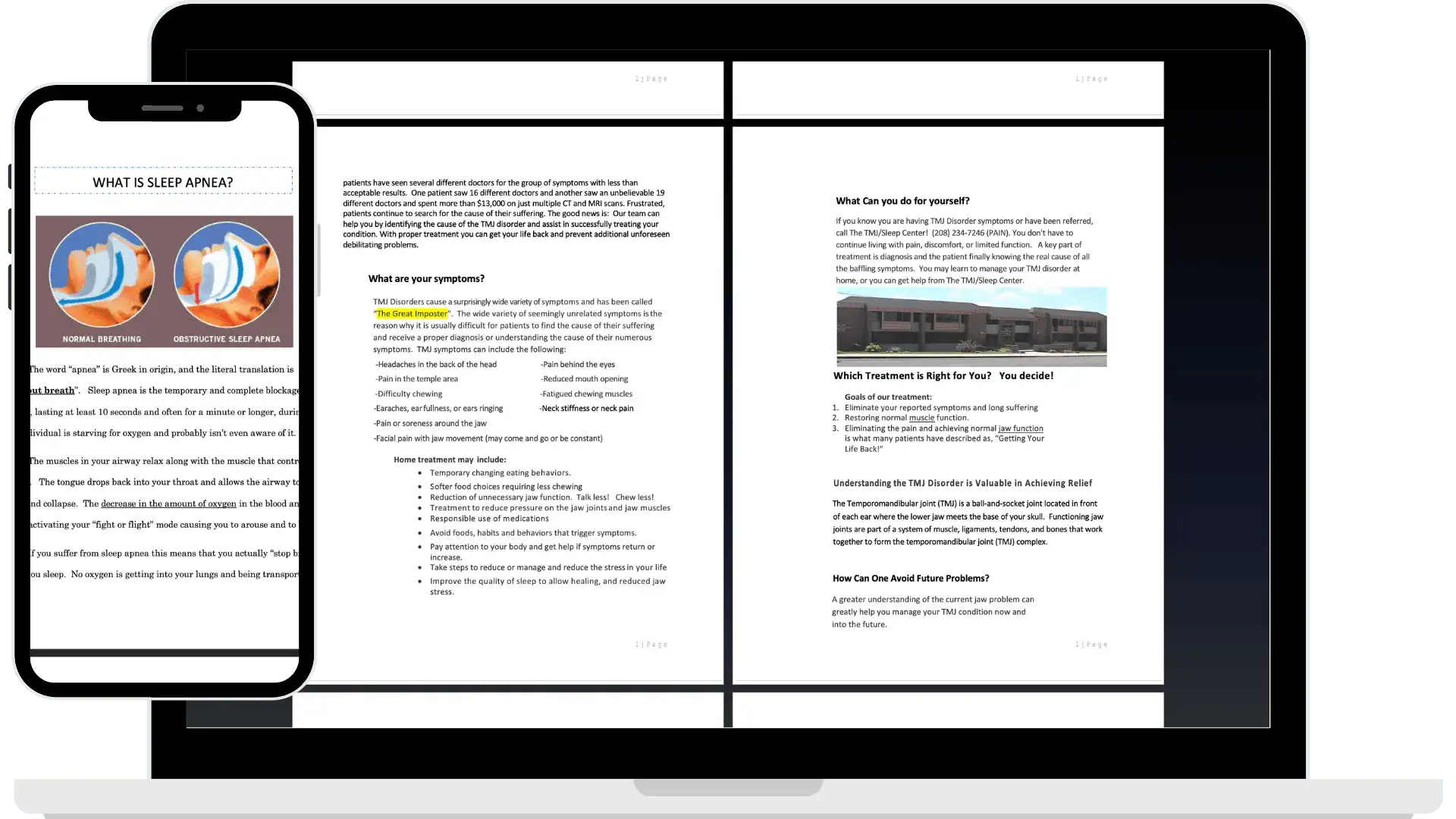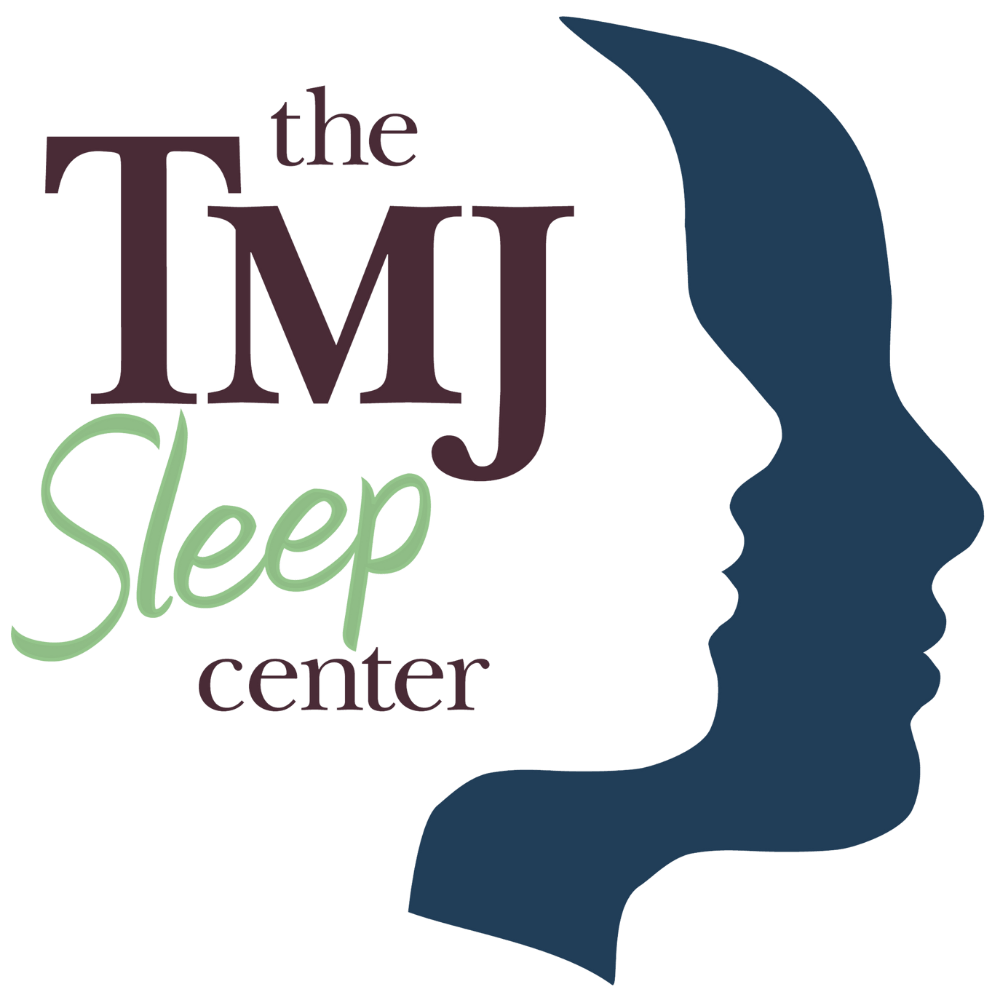Addressing TMJ Disorders
The TMJ Sleep Center - Addressing TMJ Disorders
Do you experience jaw pain and jaw popping, clicking, or grinding joints? Most TMJ patients experience jaw clicking or popping sometimes for years, but it was never a problem before! You’ll have to admit that it’s just not normal. Your jaw joint is dislocating when you hear that clicking or popping sound. You would have gone to the doctor right away if any other joint in your body had been making such noises to find out what was wrong.
These are some of the signs you may experience of TMJ disorder (TMD):
- Do you experience chronic, unexplained headaches, ringing in the ears, or back, neck, shoulder pain, or nausea?
- Do you clench or grind your teeth at night or throughout the day?
- Has your jaw ever locked open or shut?
- Are your teeth worn down and sensitive to cold? Unexplained tooth ache?
- Can you open your mouth wide enough to fit three fingers inside vertically?
The temporomandibular joint and its incredibly strong surrounding muscle groups are the subjects of a collection of issues that are referred to by this term. Your symptoms could be uncomfortable and distressing, and they might come and go for no apparent reason, but you can still treat them without surgery! Our TMJ pain doctor has 30 years of experience successfully treating thousands of individuals with these conditions, and we look forward to assisting you in living a life free of pain and headaches as you get your life back!
Locally owned and specializing in TMJ dysfunction, we work with all insurance companies. Learn more about TMJ disorders from our knowledgeable, friendly, and compassionate staff, or take a copy of Dr Romriell’s TMJ Consumer Guide.
Call for an appointment or visit us today. Walk-ins are welcome. Get your complimentary consultation, and Dr. Romriell’s free TMJ Consumer Guide.
Enjoy our fresh-baked cookies!
What Is TMJ Pain?

TMJ or jaw pain has been called the Great Imposter because everything else typically hurts except for the jaw joint (TMJ). Temporomandibular joint disorders are often referred to as TMJD, TMJ, or TMD. (Yes, too many names make it even more confusing). The jaw joint is often the one joint in the human body that we take most for granted, even though we constantly use our jaws without even realizing it as we eat, talk, and swallow.
Causes and Symptoms
Causes of TMJ disorder can include a variety of factors that have accumulated and been layered on top of one another over time.
Direct Trauma such as being hit in the face or falling on one’s face.
Indirect Trauma damage (whiplash).
Contributing factors: It is common to not know or determine the initial injury causing the TMJ disorder. Contributing factors are not the cause of TMJ disorders; although, following an initial TMJ injury, studies have shown such activities as repetitive jaw motion (chewing gum), clenching or grinding of the teeth, holding the mouth open for long periods of time (root canal), elevated physical/emotional stress, poor bite, and hyperactive jaw muscles can each add to the injury and make the TMJ disorder worse. It is very common that the contributing factors actually bring the injury into question and the common symptoms precipitate suggesting erroneously the contributing factors were possibly the cause of the TMJ disorder.
Signs and Symptoms of TMJ Disorders:
- Persistent headaches
- Dizziness and vertigo
- Fullness or ringing in the ears, ear pain
- Eye pain
- Limited or reduced jaw movement
- Pain in the face or jaw
- Abnormal or difficult swallowing
- Back pain, neck, shoulder, or behind-the-eyes
- Increased neck and shoulder stiffness
The signs and symptoms for TMJ issues listed on this page are not all-inclusive; although, they do reflect the most typical complaints patients report in the new patient interview.
Call and come see us at The TMJ Sleep Center. You will be glad you did! It can be a life changing experience.
Avoid a Misdiagnosis of Your Condition
The intensity of these disorders might range from sporadic, barely perceptible pain to severely incapacitating pain. Patients frequently go through an expensive and frustrating doctor-to-doctor hunt to find answers to relieve their ailments. Many TMD sufferers who were misdiagnosed with fibromyalgia are now using painkillers for their condition, but it may require more serious TMJ jaw pain treatment.
The signs and symptoms for TMJ issues listed on this page are not all-inclusive, but they do reflect some of the most typical complaints that patients bring up to clinicians. Come in to see us at the TMJ treatment center as soon as possible to explore your treatment options.
What Can I Do About My Condition?
Surgery must be your final resort and is advised in about 3% of individuals. The non-surgical, conservative treatment offered by The TMJ Sleep Center is favorable to patients. The bite is balanced once the pain has been managed and the jaw joint has been stabilized so that the teeth, muscles, and joints may all function together painlessly.
Treatment starts by addressing the pain. Second, functionality is recovered. Third, the patient is stabilized. To maintain your comfortable smile and bite, our doctor for TMJ will work to rehabilitate your jaws.
Because issues with the jaw joints can worsen with time, it’s essential to get an accurate diagnosis and start receiving treatment right away to stop further harm that might hinder a full recovery. A consultation at The TMJ Sleep Center is the first step to getting the answers you need.
Damaged jaw joint (TMJ) ligaments usually change the jaw joint cushion or cartilage disc between the upper and lower jaw bones. The jawbones are connected by muscles: the temporal and the masseter muscles. Each or both of these muscles could be painful and could refer to pain to your head, face, ears, eyes, shoulders, and neck. The muscles may cause abnormal movement of the lower jaw too.
Reviews
Related TMJ Services

Learn More About
The TMJ Sleep Center
Located at 1777 E Clark St, Pocatello, ID, We specialize in the treatment of TMJ disorders, migraine headaches, and sleep apnea treatments. Work with all insurance. Complimentary consultations. Walk-ins welcome. Call today for an appointment or visit us.


Share On: